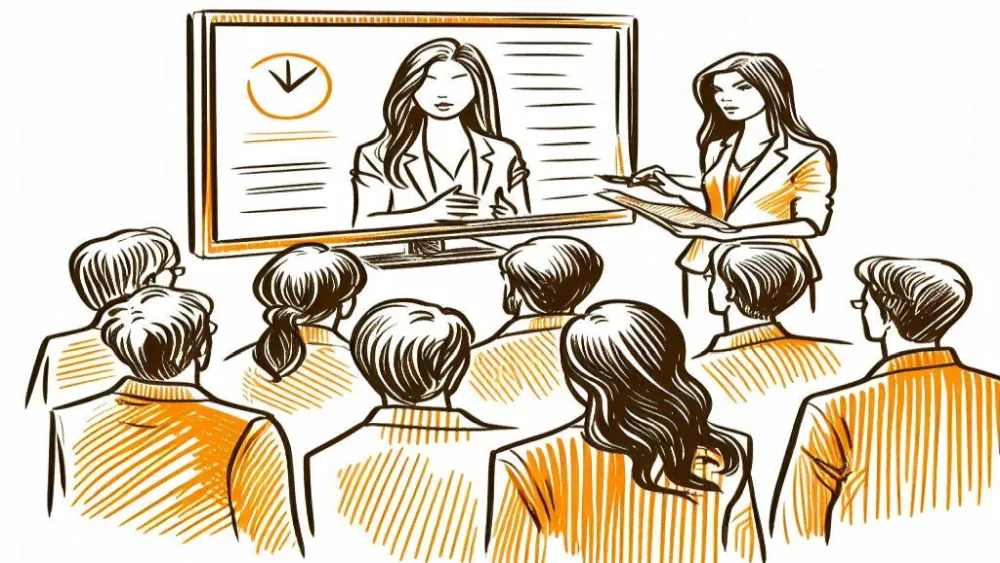 illustration: bing.com/create
illustration: bing.com/createTo date, few studies have analyzed whether moral judgments, such as how we assess someone’s behavior in a given situation, are influenced by group pressure. This topic was explored by researchers from SWPS University in collaboration with the University of Sussex and the University of Kent. The scientists also investigated how opinions about others` behavior change under the influence of avatars in virtual reality.
In the first study, the researchers examined how much participants - 103 people in total - would change their private moral judgments to align with others. First, participants independently assessed specific behaviors, such as a woman scolding her child for a bad grade in school or a man loudly answering his phone during a movie. Later, they evaluated the same behaviors in the presence of three people who responded differently than the participant.
- Participants adjusted their opinions to align with others in 43% of cases.
- However, they did so less frequently when judgments involved harm to others.
Artificial Intelligence Has Persuasive Power
In the second study, the experiment was repeated with 138 participants in a virtual environment. First, each participant individually assessed others` behavior in a given situation. Later, after putting on VR goggles, they repeated this evaluation in the presence of three avatars in virtual reality.
Some avatars were supposedly controlled by humans, while others were controlled by artificial intelligence. In the latter case, participants were informed that the Faculty of Engineering and Digital Arts at the University of Kent was testing three new algorithms implemented in the avatars.
- Participants adjusted their assessments to match those of avatars controlled by humans in 30% of cases.
- They behaved similarly in 26% of cases when the avatars were controlled by AI.
- "We usually adapt our opinions to match those of others for two reasons. First, we succumb to group pressure and seek social acceptance. Second, we may feel that we lack sufficient knowledge and view the group as a source that better interprets the current situation," explains Dr. Konrad Bocian from the Institute of Psychology at SWPS University. - "The results suggest that judgments regarding moral behavior, like other evaluations we make, are subject to pressure from both real and virtual groups."
Group Pressure as a Tool
The researchers emphasize the need for further studies to determine the extent to which digital groups can influence others` judgments. This is particularly important in the context of the rapidly evolving digital communication landscape, which may soon move into various metaverses.
Using group pressure to influence individual moral judgments in the virtual world could be used for both good and bad purposes. That’s why understanding these influence mechanisms is so crucial. Only through deeper knowledge can we increase the awareness of participants in virtual worlds regarding the influence others may exert on them.
The study was published in PLOS One:
Moral conformity in a digital world: Human and nonhuman agents as a source of social pressure for judgments of moral character
COMMERCIAL BREAK
New articles in section Skills and knowledge
War reporter in the new reality. Evolving techniques, same purpose
KFi
What happens when war breaks out just across the border and journalists aren't ready? Polish reporters faced that question after Russia invaded Ukraine in 2022. Lacking training, they improvised: blurred details, hid names, and balanced trauma with truth.
A heuristic trap in media coverage. How loud headlines boost fear
Bartłomiej Dwornik
A negative message that rests on emotion lifts the sense of threat by 57%. Why do reports of a plane crash drive investors away from airline shares? Why do flood stories spark worry about the next deluge? The pattern is irrational yet clear and proven.
How LLMs are reshaping SEO. Smart content strategies for the age of AI
BDw
For years, SEO was a fairly predictable game. Pick the right keywords, optimize your content, and watch your website climb the rankings. But today, a silent revolution is underway - and it`s being led by large language models (LLMs) like ChatGPT, Claude, Gemini, and DeepSeek.
See articles on a similar topic:
Video, Photo, or Text? What Really Works in Social Campaigns
KFi
Can ecology go viral? How can complex environmental issues be communicated in an engaging and effective way? A study by Wenye Mao and Yuko Nishide from Tohoku University analyzes two elements of narrative strategy: the type of medium (posts, posters, videos) and the mode of storytelling (individual vs. group).
How ChatGPT, Google Gemini, and Other Large Language Models Work
Krzysztof Fiedorek
These powerful algorithms can generate text, translate languages, write various types of creative content, and answer your questions in a way that often feels like a conversation with a person. But how is it possible for a machine to mimic human intelligence so well?
Visual tricks. How to influence people with color, shape and composition
Bartłomiej Dwornik
The human brain supposedly processes images up to 60,000 times faster than words. Bright colors catch the eye more - but only under certain conditions. Few people can resist the "Apache Method," and a bearded man sells better. Here are some tricks for graphical-optical mind hacking.
Common Mistakes in Creating Content for Websites
Bartłomiej Dwornik
What mistakes should you avoid at all costs to ensure that the often costly work of attracting traffic from Google doesn’t go to waste? Check out the insights from experts asked by Interaktywnie.com in the recently published report "Search Engine Marketing."






























